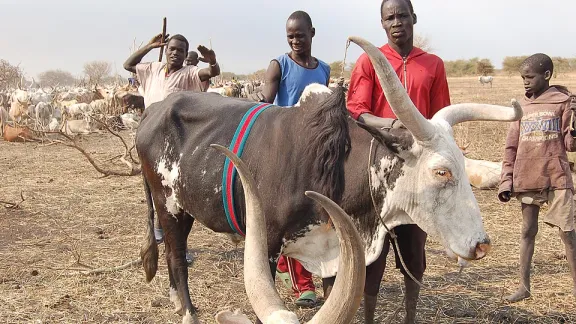
Cattle camp boys with one of their livestock © LWF/Fredrick Nzwili
LWF Supporting Peace Process Launched by Sudan Council of Churches
Ask almost anyone in South Sudan today what the key to peace is and most will have the same answer–youth.
Accurate numbers of the population in South Sudan are difficult to obtain, but it is estimated that over half the population is under 18. Although there is a high rate of literacy among adolescents–up to 90 percent–an unemployment rate of over 30 percent combined with the fact that many young people grew up during a civil war means violence has become the norm.
The cattle-rearing culture in Sudan exacerbates the problem of violence among youth. It is the youth in the cattle camps that have been behind the most recent wave of violence. Children as young as seven are sent to the camps to look after cattle. The camps contain thousands of stock forming a sea of white that reaches the horizon. Like a movable village, the camps contain schools and churches and other basic infrastructure.
As so many young people live and move around in the cattle camps, it has been difficult to engage them in the peace process, especially as the camps are in remote rural areas.
Since 2010, the Lutheran World Federation (LWF) through its Department for World Service (DWS) has been reaching out to young people with a peace building program that aims to end practices like cattle rustling, arson and child abduction in South Sudan.
The messages of the program are simple: don’t follow cattle when they are stolen, don’t steal cattle from others and keep peace among each other. Until now, the LWF program has been working among Dinka, who accept these messages but who also say that if the other tribes do not share these messages, then violence will continue and there will be no peace.
Mary Obara, LWF South Sudan program coordinator, says that, “Peace initiatives in Duk and Twic East [towns in Jonglei State] have yielded results. The rate of violence is lower in these camps but, unfortunately, the messages do not protect the youth from those in other camps who continue raiding their cattle and burning their villages.”
Mary says she knows of one man who mobilized 6,000 youth alone to raid cattle and burn villages. “If one man is able to mobilize a huge crowd, it means they have a huge following and are listened to,” she said.
In Twic East, the LWF has organized sports tournaments for the youth. “It pulls everyone together. Football and volleyball are hugely popular,” says Mary.
Another popular sport in South Sudan is wrestling. “This year we are looking at the wrestling tournaments as a way to reach the youth and as a forum to preach peace,” she says. Although the LWF has been reaching out to young people, youth have been missing from the mainstream peace process until now.
Churches are beginning to take the lead in actively engaging the youth of South Sudan in the peace process and the bishops representing the Sudan Council of Churches on 20 January in Juba announced a peace process to address the current wave of violence. The LWF is funding part of this process and the bishops have released a joint statement about “The Current Situation in Jonglei State,” outlining their plan.
“The Church has a mandate from Jesus Christ to bring peace to the world,” they said in the statement. The two-track process entails political leadership at a high level and a grassroots process. Many of those affected by the most recent waves of violence think peaceful dialogue is part of the resolution. However, any dialogue must include the youth.
John Ashworth, Sudan Advisor to the Sudan Ecumenical Forum, said that the uneven distribution of aid had contributed to the conflict. In collaboration with the ACT Alliance, the LWF has chosen to focus on reaching people in remote areas of the Jonglei State.
After five decades of violence, everyone in South Sudan will need to make an effort to nurture peace and as the future of the country peace won’t last without the participation of Sudanese youth.
(701 words)(Written for LWI by Melany Markham in Juba, South Sudan)


